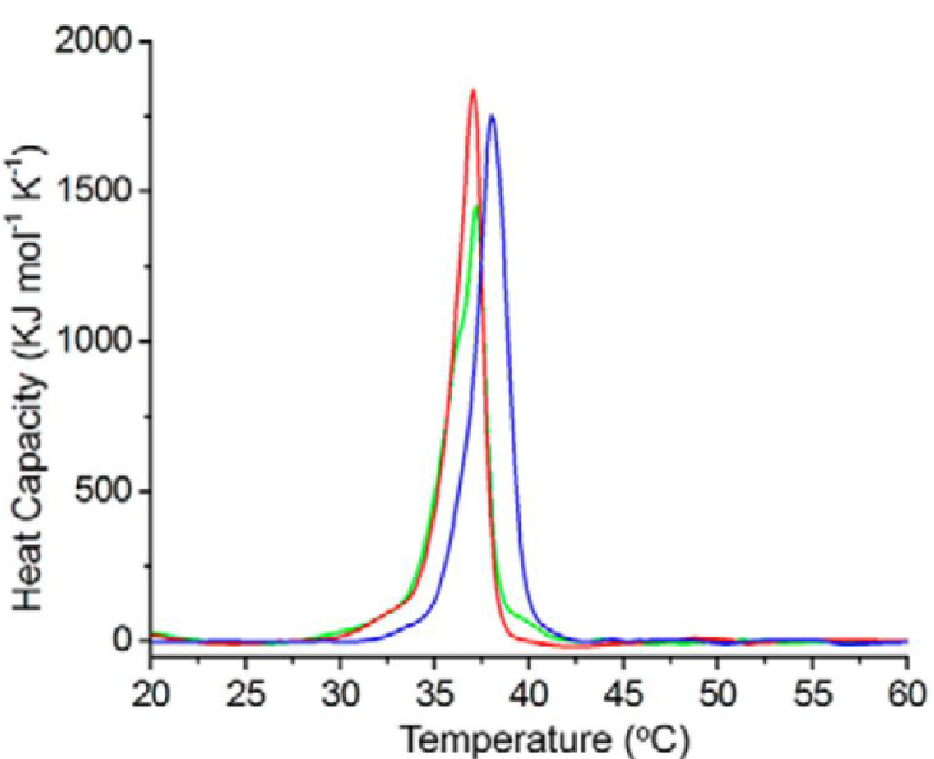Differential Scanning Calorimetry Analysis Service | Recombinant Collagen
When a material undergoes physical transitions such as crystallization, melting, or polymorphic transformation, or when it experiences chemical changes, its thermodynamic properties often shift accordingly. Parameters such as enthalpy, specific heat capacity, and thermal conductivity are key indicators of these transitions. Differential Scanning Calorimetry (DSC) is a thermal analysis technique that detects such changes by measuring the heat flow associated with temperature-dependent transformations.
Under a precisely controlled temperature program, DSC monitors the difference in heat flow between a sample and an inert reference. This technique allows researchers to observe endothermic or exothermic events associated with phase transitions, molecular interactions, or degradation. The resulting thermogram provides critical insights into the material’s melting temperature (Tm), enthalpy changes (ΔH), and overall thermal stability.

Figure 1. Differential Scanning Calorimetry of Recombinant Collagens Showing Heat Capacity as a Function of Temperature
Service at MtoZ Biolabs
MtoZ Biolabs offers a specialized Differential Scanning Calorimetry Analysis Service for recombinant collagen providing sensitive and reproducible characterization of its thermal properties across a wide temperature range with minimal sample input. The Differential Scanning Calorimetry Analysis Service supports a variety of applications, including product development, formulation optimization, stability testing, and regulatory submission, helping ensure that your recombinant collagen retains its structural integrity under thermal stress.
Analysis Workflow
1. Sample Preparation: Recombinant collagen is prepared in solution or reconstituted form under appropriate buffer conditions.
2. Instrument Calibration: The DSC system is calibrated using standard materials to ensure temperature and heat flow accuracy.
3. Thermal Scanning: Samples are heated at a controlled rate while heat flow differences between sample and reference are recorded.
4. Thermogram Generation: Endothermic peaks corresponding to collagen denaturation are captured as heat flow curves.
5. Data Interpretation: Melting temperature (Tm), enthalpy change (ΔH), and transition range are extracted and analyzed.
6. Report Delivery: A comprehensive report is provided, including thermal curves, key parameters, and expert commentary.
Service Advantages
✅Collagen-Focused Expertise
Extensive experience with recombinant collagen and related biomaterials ensures accurate interpretation of thermal profiles.
✅High Sensitivity with Low Sample Requirement
Minimal sample volume needed for precise and reproducible measurements.
✅Wide Temperature Range
Suitable for detecting thermal transitions under various physiological or formulation conditions.
✅Customizable Analysis Plans
Flexible experimental design tailored to different research and development goals.
Applications
1. Triple-Helix Stability Verification: Assess whether recombinant collagen exhibits native-like thermal denaturation behavior.
2. Formulation Screening: Evaluate the impact of pH, ionic strength, and excipients on collagen thermal stability.
3. Batch Consistency Testing: Compare thermal profiles across production lots for quality assurance.
4. Cross-Linking and Processing Evaluation: Analyze the structural effects of cross-linking, lyophilization, and sterilization treatments.
5. Storage and Shelf-Life Studies: Determine thermal stability changes under various storage conditions.
Sample Submission Suggestions
1. Sample Type
Recombinant collagen, collagen-like peptides, or lyophilized materials.
2. Storage
Store at –80°C to preserve sample stability before shipment.
3. Shipping Conditions
Ship samples on dry ice with clear labeling. Include a sample submission form with detailed sample information and buffer composition.
*Please contact us before shipping for any special requirements or pre-analysis consultation.
Deliverables
1. Comprehensive Experimental Details
2. Raw DSC thermogram data
3. Annotated thermal curves
4. Key thermal parameters (e.g., Tm, ΔH)
5. Customized report tailored to your project needs
Reliable thermal stability data are essential for understanding and validating the structural integrity of recombinant collagen across research, development, and quality control workflows. MtoZ Biolabs is committed to delivering high-quality Differential Scanning Calorimetry Analysis Services tailored to your project goals. To request a quote or discuss your analysis needs, please contact us.
Related Services
Recombinant Collagen Structure Characterization Service
Fourier Transform Infrared Spectroscopy Characterization Service | Recombinant Collagen
Recombinant Collagen Transmission Electron Microscopy (TEM) Analysis Service
How to order?







